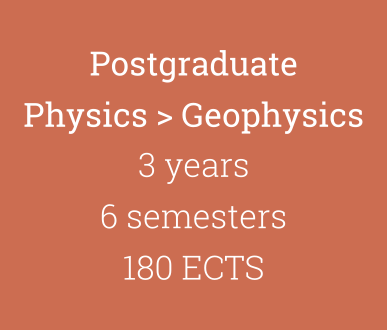The Department of Geophysics of the Faculty of Science is the only institution in Croatia that offers study programme in geophysics: on undergraduate, graduate and postgraduate level. The whole study programme itself is unique in that it insists on a relatively broad general geophysical education, with strong physical and mathematical basis, before specialization in individual professions.



Undergraduate academic research program: Bachelor of Geophysics
The study of geophysics at the Faculty of Science takes three years (six semesters), with the total of 180 ECTS credits. It ends with the exams in all courses included in the program and collecting 180 ECTS credits.
The first two years are dedicated to building a strong backround in classical (general) physics and mathematics. Undergraduates of geophysics learn about the physical basis of geophysical disciplines that are nurtured in the Geophysical Institute (meteorology, physical oceanography, seismology and physics of the inner Earth), and skills needed for professional and technical work: conducting measurements, maintenance and calibration of instruments, data collection and their basic interpretation, routine analysis of geophysical series, data archiving and field work (e.g. macroseismic research).
Graduate academic research program: Master of Physics-Geophysics
The study of physics-geophysics at the Faculty of Science takes two years (four semesters), with the total of 120 ECTS credits. The requirement for admission is completed the appropriate undergraduate or integrated university study that provides for the acquisition of appropriate competencies required for the MA program in physics-geophysics. Applicants evaluate these competencies by examining the curriculum completion of undergraduate or integrated studies. If necessary, students take supplementary courses.
The programme itself is unique in that it insists on a relatively broad general geophysical education before specialization by individual professions. Thus, the programme of the first semester is identical for all students, and in the second semester students have the option to choose one of two available directions: meteorology and physical oceanography and seismology and physics of solid Earth. The study is completed by passing the graduation exam, which consists of two parts: assessment of geophysical courses according to the list of test questions to be determined at the beginning of the academic year and the defense of thesis where the student access after successfully passing the first exam. Graduate study programme in physics-geophysics offers a thorough theoretical and practical knowledge of basic geophysical fields (meteorology, physical oceanography, seismology, geomagnetism and aeronomy) and the ability to start scientific research in the area of selected disciplines, as well as the enrolment of doctoral study.
Doctoral study programme in Physics, module Geophysics
The study is composed as a regular three-year university course in several modules: Elementary particle physics; Nuclear physics; Astrophysics; Atomic, molecular and optical physics; Condensed matter physics; Biophysics; Medical physics; and Geophysics. The students who complete the study and defend the doctoral thesis obtain the degree
"Doctor of Natural Sciences in the Field of Geophysics"
(Doctor scientiarum naturalium ad geophysicam pertinentium).
Doctoral study programme includes lectures and research component. The research component is primary, while lectures are intended to prepare student and help them with their research, and to provide them with wider view on their field. Lectures are mostly limited to the first year of the programme. Research component starts at the very beginning of the programme and includes original research, writing and publication of scientific papers, and writing and defence of doctoral dissertation.

 Pristupačnost
Pristupačnost